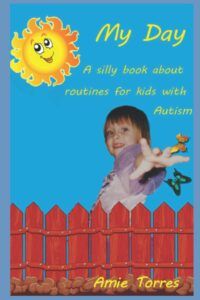Everyday Routines
This topical guide will introduce you to important books, videos, and information resources available from the EI Clearinghouse and other sources. Contact us via online form or by phone (1-877-275-3227) to request a resource listed below (or ask your local public librarian). Note that some videos may be viewed online, and journal titles will take you to the publisher’s homepage.
Table of Contents

EIC Resources
A series of parent-friendly tip sheets sharing activities that families can do to help children receiving early intervention services.
Books
Using objects easily found in most homes, this collection of purposeful play experiences will help babies and toddlers develop key skills at their own pace and make unhurried important discoveries.
Using objects easily found in most homes, this collection of purposeful play experiences will help babies and toddlers develop key skills at their own pace and make unhurried important discoveries.
This book is packed with simple, highly effective suggestions for strengthening critical skills during daily routines, from dressing in the morning to getting ready for bed.
This book provides 52 strategies – one for every week of the year – to help caregivers stimulate healthy brain growth in young children.
This practical book explores the role of the coach and reviews the “whats,” “whys,” and “how-tos” of successful collaboration with parents.
Effective early intervention doesn’t stop when the provider leaves the family’s home. Targeting 80 skills in 6 key developmental domains for children birth to three, this reader-friendly guide gives professionals dozens of ready-to-use ideas for helping families and caregivers embed learning opportunities in their everyday routines.
This is a board book about brushing teeth featuring a lovable little crocodile. It helps to discover the big moments and daily routines of every toddler’s life, with lovable animal characters and a playful, rhyming text.

Routines to help kids to sleep
This book provides 100 games, activities, and exercises that parents can do with their baby to foster cognitive, motor, and language skills and shows parents how they can use daily caregiving routines such as feeding, diapering, dressing, bathing, and bedtime as opportunities for play, positive emotional attachment, and learning.

A silly book about routines for kids with autism. This story is based upon the author’s daughter and her childhood.
This book highlights 65 essential activities that use play as a vehicle for teaching and skill-building. With options that focus on everything from fine and gross motor skills to observation and investigation skills and beyond, these activities are guaranteed to delight your little one while introducing fundamental concepts and sparking curiosity.
Your child’s daily routines are transformed into learning opportunities that promote crucial abilities, such as how to imitate others or use simple hand gestures to convey wants and needs.
This hilarious, over-the-top story is perfect for any little girl who doesn’t like to brush her hair. Teach the importance of taking care their hair.
Through 7 simple, proven steps, you’ll adopt an effective system of habits that will enable you to become who you want to be and open the door to constant growth.
The authors explain the new science of how a child’s brain is wired and how it matures, along with advice on how to put this information to work in raising happier, calmer children
Videos and Media
This video offers parents, caregivers and professionals an eye-opening look at the extraordinary world of children’s learning that occurs every day as part of community life.
Routines help build executive function skills in children. These functions are essential to daily behaviors and decision-making. You can start building routines from a young age.
Illustrates how developing a set of well-though-out rules, ritual and routines will make parents’ lives easier and their children happier and well-behaved.
Organizations
No resources have been added to this section yet. However, new resources are added frequently!Articles
The aim of this study is to examine the effects of a school-based intervention on 24-hour movement behaviors (i.e., physical activity, screen-based behaviors, and sleep), Mediterranean diet, and self-rated health status
This article describes two national surveys that were conducted to identify and categorize the various kinds of activities serving as the sources of learning opportunities for young children birth to 6 years of age in the context of family and community life.
From National Association for the Education of Young Children (NAEYC). This article offers an evidence-based approach to planning your outdoor play space for caregivers.
Web Resources
Maintaining regular routines provides a sense of order to daily life. It lets everyone know when the day begins, what activities will occur when and where, and what role everyone is expected to play. There are at least three family routines to maintain: bedtime and sleep, mealtime, and physical activity. Learn more about these routines in this brief.
These tips will assist the early intervention provider and the families they serve to learn how to embed strategies into a family’s natural routines.
Grown-ups often use a daily calendar or checklists to remind them of their meetings and tasks. Children also benefit from simple schedules or checklists. Using schedules or checklists are supports for children who benefit from knowing the routine and self-assessing their ability to follow the routine and typical expectations.

